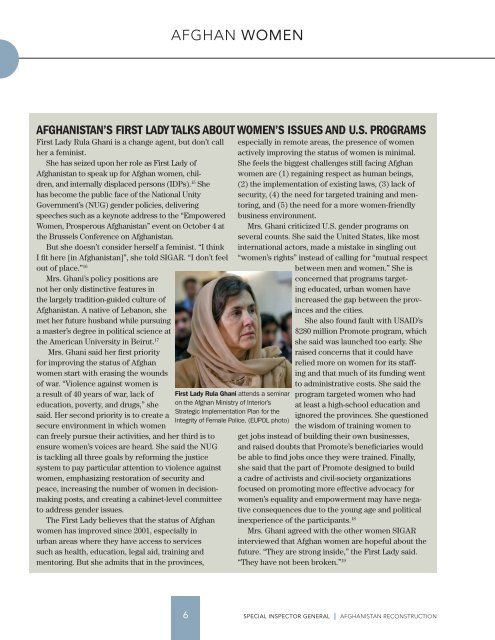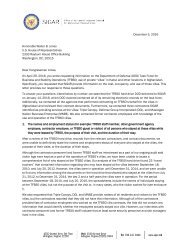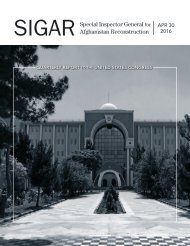SIGAR
2016-10-30qr
2016-10-30qr
Create successful ePaper yourself
Turn your PDF publications into a flip-book with our unique Google optimized e-Paper software.
AFGHAN WOMEN<br />
AFGHANISTAN’S FIRST LADY TALKS ABOUT WOMEN’S ISSUES AND U.S. PROGRAMS<br />
First Lady Rula Ghani is a change agent, but don’t call<br />
her a feminist.<br />
She has seized upon her role as First Lady of<br />
Afghanistan to speak up for Afghan women, children,<br />
and internally displaced persons (IDPs). 15 She<br />
has become the public face of the National Unity<br />
Government’s (NUG) gender policies, delivering<br />
speeches such as a keynote address to the “Empowered<br />
Women, Prosperous Afghanistan” event on October 4 at<br />
the Brussels Conference on Afghanistan.<br />
But she doesn’t consider herself a feminist. “I think<br />
I fit here [in Afghanistan]”, she told <strong>SIGAR</strong>. “I don’t feel<br />
out of place.” 16<br />
Mrs. Ghani’s policy positions are<br />
not her only distinctive features in<br />
the largely tradition-guided culture of<br />
Afghanistan. A native of Lebanon, she<br />
met her future husband while pursuing<br />
a master’s degree in political science at<br />
the American University in Beirut. 17<br />
Mrs. Ghani said her first priority<br />
for improving the status of Afghan<br />
women start with erasing the wounds<br />
of war. “Violence against women is<br />
a result of 40 years of war, lack of<br />
education, poverty, and drugs,” she<br />
said. Her second priority is to create a<br />
secure environment in which women<br />
can freely pursue their activities, and her third is to<br />
ensure women’s voices are heard. She said the NUG<br />
is tackling all three goals by reforming the justice<br />
system to pay particular attention to violence against<br />
women, emphasizing restoration of security and<br />
peace, increasing the number of women in decisionmaking<br />
posts, and creating a cabinet-level committee<br />
to address gender issues.<br />
The First Lady believes that the status of Afghan<br />
women has improved since 2001, especially in<br />
urban areas where they have access to services<br />
such as health, education, legal aid, training and<br />
mentoring. But she admits that in the provinces,<br />
First Lady Rula Ghani attends a seminar<br />
on the Afghan Ministry of Interior’s<br />
Strategic Implementation Plan for the<br />
Integrity of Female Police. (EUPOL photo)<br />
especially in remote areas, the presence of women<br />
actively improving the status of women is minimal.<br />
She feels the biggest challenges still facing Afghan<br />
women are (1) regaining respect as human beings,<br />
(2) the implementation of existing laws, (3) lack of<br />
security, (4) the need for targeted training and mentoring,<br />
and (5) the need for a more women-friendly<br />
business environment.<br />
Mrs. Ghani criticized U.S. gender programs on<br />
several counts. She said the United States, like most<br />
international actors, made a mistake in singling out<br />
“women’s rights” instead of calling for “mutual respect<br />
between men and women.” She is<br />
concerned that programs targeting<br />
educated, urban women have<br />
increased the gap between the provinces<br />
and the cities.<br />
She also found fault with USAID’s<br />
$280 million Promote program, which<br />
she said was launched too early. She<br />
raised concerns that it could have<br />
relied more on women for its staffing<br />
and that much of its funding went<br />
to administrative costs. She said the<br />
program targeted women who had<br />
at least a high-school education and<br />
ignored the provinces. She questioned<br />
the wisdom of training women to<br />
get jobs instead of building their own businesses,<br />
and raised doubts that Promote’s beneficiaries would<br />
be able to find jobs once they were trained. Finally,<br />
she said that the part of Promote designed to build<br />
a cadre of activists and civil-society organizations<br />
focused on promoting more effective advocacy for<br />
women’s equality and empowerment may have negative<br />
consequences due to the young age and political<br />
inexperience of the participants. 18<br />
Mrs. Ghani agreed with the other women <strong>SIGAR</strong><br />
interviewed that Afghan women are hopeful about the<br />
future. “They are strong inside,” the First Lady said.<br />
“They have not been broken.” 19<br />
6<br />
SPECIAL INSPECTOR GENERAL I AFGHANISTAN RECONSTRUCTION




